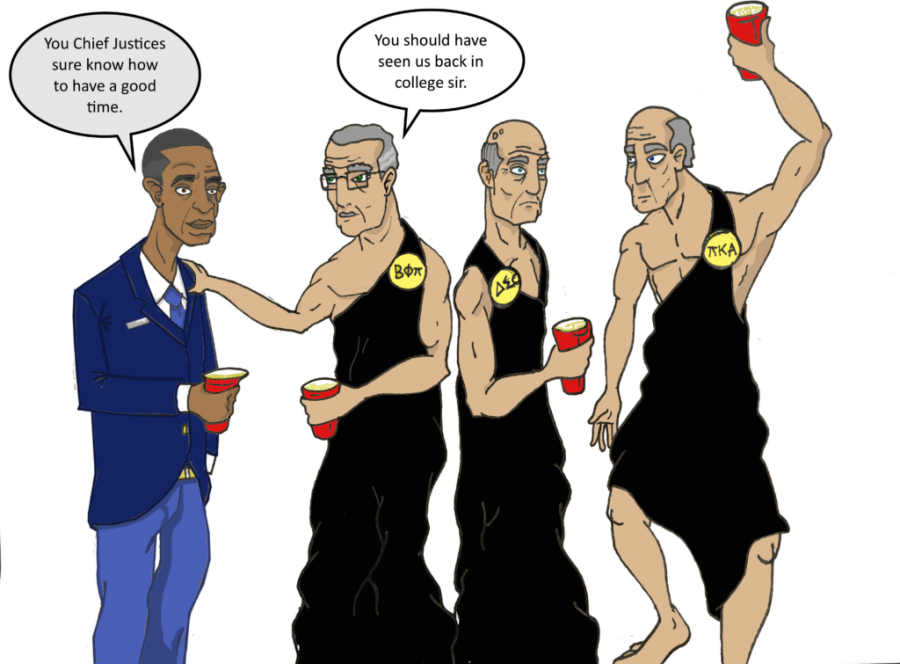Maintaining an aggressively negative stance towards Greek life is the easiest position for anyone to hold. This notion makes rational sense, as decades of denouncing Greeks have taken advantage of humans’ inclination to disdain from cognitive reasoning. Indeed, it’s remarkably easy to come to the conclusion that all fraternities worship alcohol — alongside their promiscuous sorority counterparts — rather than question the legitimacy of critics. National networks have long benefitted from dramatizing news of Greek indiscretion.
Greek life on many campuses does involve alcohol and there are documented incidents of hazing broadcast via YouTube. However, there are many facets of Greek life that are frequently disregarded. Nationally, there are over nine million students involved in the Greek system. Each of these individuals —despite the immense diversity — must be dependent upon alcohol, right?
Well, let’s first look at those responsible for overseeing the private sector. In the United States, nearly 85 percent of all Fortune 500 executives belonged to a fraternity. Furthermore, since the year 1910, 40 of the last 47 Supreme Court Justices were former Greeks. Seventy-six percent of congressmen and senators were once in a fraternity, in addition to nearly every U.S. President since 1825. Since 1900, nearly 63 percent of all presidential cabinet members are Greek alumni.
It’d be fair to criticize those statistics, in part because they generally pertain to fraternities. Furthermore, they have little correlation to the lives of many Americans, describing only a small segment of the population. Yet, even here at the U, the student body president himself is Greek. Furthermore, our very first female senator was Greek, in addition to the first female astronaut. Hell, in terms of space, the entire Apollo 11 crew was once a member of the Greek system. These numbers likely contribute to the 20 percent higher graduation rate of Greeks, as compared to their non-Greek peers.
Clearly, it must be the fumes of alcohol driving these students to succeed.
Another point of consideration is philanthropy, which is service done for the local community. This term is an undeniable attribute of the system. In the U.S., well over seven million dollars are raised nationally by Greek chapters for charity. Keep in mind, these are college students. Furthermore, the Greek system is responsible for over 10 million hours of volunteering each year and often forms the largest bloc of donors to universities. This particular point indicates the deeper connection to alma maters developed by Greek alumni.
This broad array of statistics is often disregarded by critics; instead, attention is diverted to the dues (or fees) associated with fraternities and sororities. Compared to the rising costs of college, one U.S. Office of Education study found that, “Less than two percent of an average college student’s expenses go toward fraternity dues.” If students don’t have the capacity to pay, often they can find help financially, as they’re aided by a broad alumni network.
Finally, in terms of hazing, scrutiny of the Greek system has led to renewed oversight by national chapters. At the U, pledges are told to report incidents of hazing directly to house presidents, who are then bound to handle the situation. If the house is found guilty of hazing new members, their national organization will initiate an investigation, purging those found responsible for violating regulations. While these rules don’t stop all chapters from acting maliciously, they certainly contribute towards a safer Greek system.
Casting Greek life as misguided is effortless, aided by isolated incidents of physical harm. The avenues through which Greeks benefit local communities is notable. These acts, combined with higher graduation rates, help to paint a positive portrait of Greek life. Abstain from simply buying into the narrative that all Greeks openly promote hazing and drink copiously. Instead, choose to question the depth of an argument that says nearly nine million people are entirely misguided. Only then can one see the bigger picture and let innate bias fade away.


